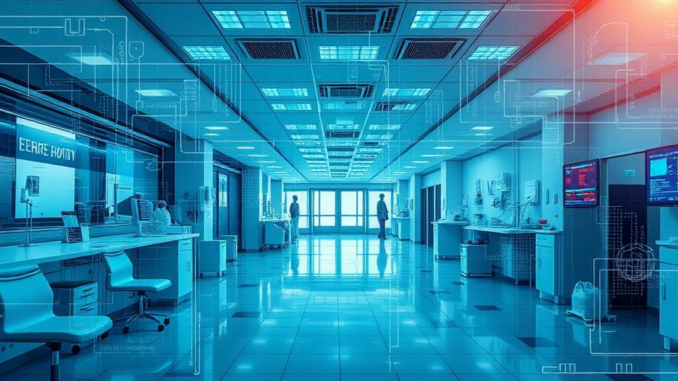
Summary
Healthcare data breaches are increasing, causing operational disruptions and jeopardizing patient safety. Hospitals are prime targets due to their reliance on interconnected systems and sensitive data. Implementing robust cybersecurity measures and staff training is crucial for mitigating these risks.
Safeguard patient information with TrueNASs self-healing data technology.
** Main Story**
Okay, so cyberattacks on healthcare are a really big problem these days, right? It’s not just about the money; it’s literally putting patient lives on the line. Remember that ransomware attack on the Wirral University Teaching Hospital in the UK back in November 2024? It was a complete mess; they had to cancel appointments and go back to using paper, like it’s the dark ages. Seriously, it really drives home how vulnerable these systems are. So, let’s dive into this a bit. I want to talk about the rising threat of ransomware and data breaches aimed at hospitals, what impact they have, and what we can do to beef up protection.
Why Hospitals? Easy Targets, Unfortunately
Honestly, hospitals are like honey pots for cybercriminals. They’re sitting on mountains of sensitive patient data – medical histories, financial details, all that juicy personally identifiable info. That stuff goes for a fortune on the dark web. And, because hospitals rely so heavily on interconnected digital systems, they’re super susceptible to ransomware. I mean, when those systems crash, it’s not just inconvenient; it can be catastrophic. We’re talking about treatment delays, errors, and, yeah, even increased mortality rates. It’s terrifying to think about.
WannaCry: A Rude Awakening
Remember WannaCry back in 2017? Talk about a wake-up call! That global attack hit hospitals in something like 150 countries. It showed just how interconnected everything is and how easily a single vulnerability can cause widespread chaos. And let’s not forget, the Wirral University Teaching Hospital wasn’t an isolated incident; these attacks are happening more and more frequently. Experts are saying they’re getting more sophisticated and doing even more damage. We really need some fresh strategies to protect hospitals and patient data, and fast.
The Fallout: It’s Not Just About the Money
Okay, so, ransomware attacks are expensive, no doubt. But the real cost goes way beyond the financial hit. They seriously mess with patient care. Think canceled appointments, surgeries pushed back, heck even more medical errors occurring. When the electronic systems crash, hospitals often have to revert to manual processes. Which, let’s face it, are way less efficient and lack the safety checks we’re used to. That increases the risk of mistakes and misdiagnosis, no comma. Remember that time my dentist’s office had a system outage, and they almost gave me the wrong medication? That was scary enough! Imagine that happening in a hospital setting.
On top of that, get this: studies have actually linked ransomware attacks to an increase in in-hospital mortality rates. Seriously. I read an analysis that estimated dozens of Medicare patients died between 2016 and 2021 because of ransomware. And it’s not just the directly-hit hospitals that suffer. Neighboring hospitals get slammed with extra patients, straining their resources and, potentially impacting patient outcomes too. The University of California San Diego even found an 81% jump in cardiac arrest cases at neighboring hospitals after attacks. Can you believe that? That’s wild!
Time to Level Up Security: A Call to Arms
So, what do we do? Well, protecting hospitals from these cyber threats needs a multi-pronged approach. It’s not a one-and-done solution. Hospitals need to prioritize cybersecurity spending; they have to put real money into bolstering their defenses. That means beefing up security protocols, keeping software and systems updated, and giving all staff some serious cybersecurity training.
And speaking of staff training, it’s HUGE. Human error is, sadly, a major contributor to breaches. People need to know how to spot phishing emails and other sneaky attempts to break into the system. Strong passwords, multi-factor authentication, and secure remote access setups are crucial, too. And I cannot stress enough that hospitals need to enforce these measures. Run regular security audits, do some penetration testing, find the weak spots, and fix ’em.
But, you know, it’s not just on the hospitals themselves. Healthcare providers, cybersecurity experts, and government agencies need to be working together. Share info, develop best practices, and help each other stay one step ahead of these criminals. It’s a constant battle, I’m afraid.
Okay, so the healthcare industry is facing a cyber threat landscape that is growing and changing all the time. However, by prioritizing cybersecurity investments, implementing solid security measures, and providing comprehensive staff training, hospitals can better protect themselves and their patients from ransomware and data breaches and avoid such devastating consequences. Really, the time to act is now, before even more lives are potentially put at risk. I think it’s a responsibility we all share in protecting vulnerable patients. What do you think?


An 81% jump in cardiac arrests at *neighboring* hospitals post-attack? So a cyberattack is essentially a digital heartbreaker, causing collateral damage to nearby institutions. Makes you wonder if hospitals need cybersecurity first aid kits for each other.
That’s a great analogy! A “cybersecurity first aid kit” for hospitals is a fantastic idea. Maybe that would include incident response plans readily available to nearby hospitals, pre-negotiated support from cybersecurity firms, and a shared threat intelligence network. Building that kind of resilience could really minimize disruption and protect patient well-being.
Editor: MedTechNews.Uk
Thank you to our Sponsor Esdebe
Hospitals reverting to paper after a cyberattack? That’s like performing open-heart surgery with a butter knife. Maybe we should invest in carrier pigeons as a backup communication system. Secure. Encrypted. Feathered.
That’s a hilarious image! The idea of carrier pigeons adds a touch of whimsy to a serious problem. Thinking outside the box, perhaps a decentralized, encrypted messaging system could offer a more modern, robust alternative to paper records during a cyber crisis. It’s vital we find solutions that maintain both security and efficiency.
Editor: MedTechNews.Uk
Thank you to our Sponsor Esdebe